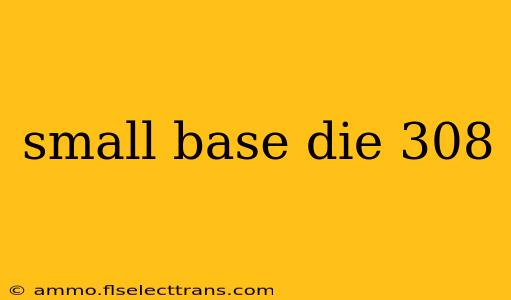The .308 Winchester, a popular cartridge for hunting and target shooting, relies heavily on the quality of its reloading components. Among these, the small base die plays a crucial role in ensuring consistent and accurate ammunition. This guide delves into the intricacies of small base dies, explaining their function, benefits, and considerations for .308 Winchester reloading.
Understanding Small Base Dies and Their Purpose
A small base die is a specialized reloading die designed to resize the case body to a slightly smaller diameter than standard full-length sizing dies. This subtle difference offers several key advantages, particularly when dealing with semi-automatic rifles or those with tight chamber tolerances. The reduced diameter facilitates smoother chambering, minimizing the potential for malfunctions like failure to feed or extract.
Key Differences from Full-Length Sizing Dies
The primary distinction lies in the die's sizing mechanism. Full-length sizing dies resize the entire case, including the neck and shoulder. Small base dies, conversely, primarily focus on the case body, leaving the neck and shoulder largely untouched. This approach helps preserve case neck tension, which is essential for accurate bullet seating and consistent shot grouping.
Benefits of Using Small Base Dies for .308 Winchester
Employing a small base die for your .308 Winchester reloading offers a range of benefits:
-
Improved Reliability in Semi-Automatic Rifles: The reduced case diameter ensures smoother cycling in semi-automatic rifles, reducing the chances of malfunctions. This is particularly important for high-volume shooting or demanding conditions.
-
Reduced Case Head Separation: By minimizing the stress on the case head during resizing, the use of a small base die can help extend the lifespan of your brass, reducing the incidence of case head separation.
-
Enhanced Accuracy: Preserving neck tension through selective resizing contributes to more consistent bullet seating depth and improved accuracy on the target. This is particularly beneficial for precision shooting applications.
-
Easier Case Extraction: While not always a prominent factor, the slightly smaller case body can lead to smoother case extraction, especially in rifles with tighter chambers.
Considerations Before Using Small Base Dies
While small base dies offer advantages, it's vital to understand potential drawbacks:
-
Increased Pressure: Using a small base die may slightly increase chamber pressure. Therefore, it's crucial to meticulously monitor your reloading process and adhere to safe reloading practices. Always load to published pressure limits or below.
-
Compatibility: Ensure compatibility with your specific rifle's chamber dimensions. Using a small base die in a rifle with loose chamber tolerances might not yield significant benefits.
-
Case Life: Although small base dies may reduce case head separation, excessive resizing may still shorten the overall lifespan of your brass. Consider incorporating other techniques, such as neck sizing, to extend the life of your cases.
Choosing the Right Small Base Die for .308 Winchester
Selecting the right small base die involves considering several factors:
-
Die Brand: Reputable die manufacturers, such as RCBS, Lee, Hornady, and Redding, offer quality small base dies for .308 Winchester. Each brand has its strengths and weaknesses; research reviews before selecting.
-
Materials: Look for dies constructed from robust materials capable of withstanding repeated use.
-
Compatibility: Confirm that the die is compatible with your specific reloading press.
-
Reviews: Check online reviews from other reloaders to gauge the performance and reliability of different die brands and models.
Conclusion: Optimizing Your .308 Winchester Reloading
Small base dies can significantly enhance your .308 Winchester reloading experience, contributing to improved reliability, accuracy, and extended brass life. However, careful consideration of potential trade-offs and diligent adherence to safe reloading practices are crucial for optimal results. By understanding their benefits, limitations, and proper usage, you can unlock the full potential of this specialized reloading component and improve your precision shooting.

